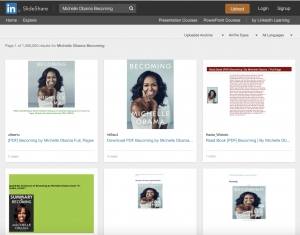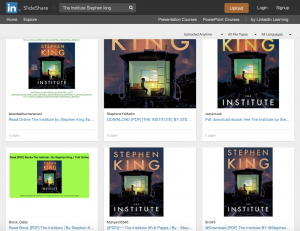If you want to purchase a copy of The Institute, Stephen King’s latest novel about supernatural kids, you could find it at your local bookstore or order it on Amazon. You could also head to your local library, where the world’s books are available for the low, low price of free. And if you want to download an e-copy of King’s book without paying for it, there’s also SlideShare, a hosting service owned by LinkedIn that has become home to a vast warehouse of illegally pirated books.
Now 14 years old, SlideShare serves as a repository for professional slide-decks, infographics, and other kinds of visual presentations. If you’ve sat through a corporate meeting or a webinar over the past decade, chances are good that the person hosting your meeting relied on it. At first glance, it’s not a natural channel for content piracy; few people would probably want to read a book broken out, sentence by sentence, across hundreds of slides.
But e-book pirates have figured out clever ways to make their content discoverable with help from SlideShare’s user-friendly interface. Typically, they will build a short slide-deck with the book’s cover image and step-by-step instructions for downloading the text from a third-party piracy site.
The more popular the book, the more pervasive the SlideShare piracy. Searches for the top five fiction and nonfiction books on the New York Times bestseller list (which includes authors ranging from Malcolm Gladwell to Delia Owens to Ronan Farrow) produce multiple pages of pirated e-book links on SlideShare for each title. For instance, Michelle Obama’s Becoming, which sold 10 million copies by March 2019, has dozens of pirated links on SlideShare, some of which pop up on the first page of search results when you type “Michelle Obama.”

“Your work should get out there because you or your publisher or, better still, readers have been promoting it,” says Steve Cavanagh, the award-winning author of the novel Thirteen and other mysteries. “Not because someone stole it.”
LinkedIn, which is owned by Microsoft, is aware of SlideShare’s piracy problem, and it claims to do what it can combat the problem. “We use a combination of technical and human measures to detect content that could be in violation of our Terms of Service and when we find it we take action,” a company spokesperson wrote in an email to Fast Company. “We encourage members to report any content they find questionable, including any potential copyrighted content, to us. Our teams work swiftly to address every incoming copyright infringement report to help SlideShare remain a site where content owners’ intellectual property rights are respected and is a place where they can safely share their ideas and work with their communities.”
But those efforts have not stopped pirated books from proliferating on the platform. LinkedIn did not respond to a follow-up question about whether it has ramped up efforts or deployed additional technology that would proactively eliminate broad swaths of pirated content.
SlideShare claims that it’s one of the top 100 most-visited websites in the world, with “18 million uploads in 40 content categories.” Between January and June 2019, the last period for which figures are publicly available, LinkedIn received reports of 116,164 copyright infringements across its platforms (including SlideShare) and removed 116,127 pieces of content; it rejected 37 of those reported cases. That might seem like a very small percentage of people who use LinkedIn and SlideShare overall—but tell that to an author whose books have been downloaded thousands of times illegally.

“In order to meaningfully address book piracy and the significant harm that it causes authors and publishers,” a spokesperson for the Association of American Publishers, the trade association of the U.S. book publishing industry, wrote in an email, “every player in the ecosystem should be responsible and take an active role in preventing theft on their platforms.”
The impact on authors
Ever since the turn of the century, when faster internet connections and more powerful hardware allowed people to start illegally downloading music and movies from networks such as Napster and LimeWire, pirates have argued that it’s largely a victimless crime. The logic runs something like this: The big corporations that make and market media products rack up millions or billions of dollars, and so they won’t miss the lost revenue from a few pirated copies.
A variation of that argument extends to the academic world, where cash-strapped students pirate textbooks that (they argue) cost far too much. As Richard Conniff pointed out in a 2019 New York Times op-ed about this academic piracy, a portion of those who download content illegally somehow can’t believe they’re harming an author or other content creator by doing so: “My students looked baffled, but unpersuaded, caught up in the convenient rationalization that authors subsist on inspiration and the purest love of subject matter.”
Rob Hart, authorPeople who steal stuff are just inclined to do it.”
Whether Amazon, Google, Facebook, or (in the case of SlideShare) Microsoft, tech companies have largely failed to come up with a comprehensive and proactive solution to squish the bulk of pirated content spreading across the web. If stolen e-books weren’t bad enough, in fact, Amazon now has a problem with counterfeit print books sold on its platform by unscrupulous parties—although the company claims that it uses machine learning and other cutting-edge techniques to stop much of this activity before it hits their marketplace.
Indeed, many authors are fully aware that their books are pirated—and they hate it. “Piracy is bad, full stop, and I don’t entertain excuses for it, because pretty much any excuse offered by the pro-pirating set is nonsense,” said Rob Hart, an author whose recent novel The Warehouse, which was optioned by director Ron Howard, has generated pages of pirated links on SlideShare. “But I also believe people who steal stuff are just inclined to do it; there isn’t any kind of reasoned argument that’s going to change their minds.”
In other words, there’s no point in tracking these pirates down. “Rather than scream into the void,” Hart added, “I just hope a few of the folks who steal my book decide to drop money on someone else I do somewhere down the line.”
Cavanagh likewise believes that e-book piracy is largely unstoppable. “It’s like a hydra,” he says. “One head gets cut down and two more spring up.”
Last year, the Authors Guild estimated that book piracy costs publishers roughly $300 million annually. While some pirates might suggest they have no problems harming a corporation’s bottom line, a significant percentage of that revenue is earmarked for authors’ royalties—which means that piracy has a very real impact on whether authors, particularly midlist and indie ones, can continue to practice their craft. It’s not a victimless crime.
“It’s about what we’re losing by having a small section of people who have no problem stealing creative work when there’s no need to do it,” Cavanagh says. “They can get it from the library and support the artists and their community. And by not doing that, they are losing out, as are we all.”
Recognize your brand’s excellence by applying to this year’s Brands That Matter Awards before the early-rate deadline, May 3.
